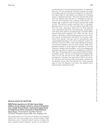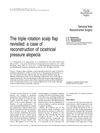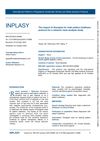 September 2023 in “Medical and Clinical Case Reports”
September 2023 in “Medical and Clinical Case Reports” People with Alopecia Areata often have thyroid problems like Hashimoto thyroiditis and hypothyroidism.
 June 2023 in “British journal of dermatology/British journal of dermatology, Supplement”
June 2023 in “British journal of dermatology/British journal of dermatology, Supplement” Patients with alopecia areata face challenges accessing Janus kinase inhibitors, but some see positive results.
 63 citations,
May 2017 in “American Journal of Clinical Dermatology”
63 citations,
May 2017 in “American Journal of Clinical Dermatology” People with alopecia areata often have lower levels of vitamin D, zinc, and folate, but more research is needed to understand if supplements can help treat it.
 35 citations,
January 1993 in “International Journal of Dermatology”
35 citations,
January 1993 in “International Journal of Dermatology” People with HIV and low T cell counts have more hair and scalp problems.
 23 citations,
November 2018 in “Journal of the European Academy of Dermatology and Venereology”
23 citations,
November 2018 in “Journal of the European Academy of Dermatology and Venereology” The study concluded that severity of Frontal fibrosing alopecia is not linked to how long someone has it, can start before menopause, and eyebrow loss may be an early sign.
 4 citations,
July 2022 in “Clinical and Experimental Dermatology”
4 citations,
July 2022 in “Clinical and Experimental Dermatology” Using more than 5% minoxidil can help hair growth more, but results vary and side effects may increase.
 June 2023 in “Dermatology and therapy”
June 2023 in “Dermatology and therapy” The Middle East and Africa need better data, treatment consensus, and support for Alopecia Areata.
 16 citations,
July 2006 in “International Journal of Oral and Maxillofacial Surgery”
16 citations,
July 2006 in “International Journal of Oral and Maxillofacial Surgery” The triple rotation scalp flap technique successfully reconstructed a man's scalp with natural-looking hair growth and minimal scarring.
 15 citations,
November 2015 in “Journal of Dermatology and Dermatologic Surgery”
15 citations,
November 2015 in “Journal of Dermatology and Dermatologic Surgery” Mixing platelet-rich plasma with triamcinolone acetonide can potentially improve hair regrowth in alopecia areata patients.
1 citations,
January 2020 in “Skin Appendage Disorders” Treatment with methotrexate and prednisolone led to complete hair regrowth and no relapse for 2 years.
 September 2023 in “Cureus”
September 2023 in “Cureus” Early recognition and treatment of atypical alopecia areata in infants are crucial.
 June 2023 in “Buletin de psihiatrie integrativă”
June 2023 in “Buletin de psihiatrie integrativă” Alopecia causes significant emotional distress and psychological issues, requiring combined skin and mental health treatment.
 27 citations,
July 2017 in “Facial Plastic Surgery”
27 citations,
July 2017 in “Facial Plastic Surgery” Platelet-Rich Plasma (PRP) shows promise for hair growth and skin improvement in aesthetic surgery.
 18 citations,
January 2014 in “Postępy Dermatologii i Alergologii”
18 citations,
January 2014 in “Postępy Dermatologii i Alergologii” Personalized treatment plans are important for people with alopecia areata.
 6 citations,
October 2013 in “Expert Review of Dermatology”
6 citations,
October 2013 in “Expert Review of Dermatology” Psychotropic medications can cause skin problems, including serious conditions, and patients should be monitored closely.
July 2024 in “Anais Brasileiros de Dermatologia” PRP injections can increase hair density in people with androgenic alopecia.
 November 2021 in “International Journal for Research in Applied Science and Engineering Technology”
November 2021 in “International Journal for Research in Applied Science and Engineering Technology” Lyophilized platelet-rich plasma is beneficial and effective for various medical treatments, including tissue regeneration and hair regrowth.
 January 2009 in “Springer eBooks”
January 2009 in “Springer eBooks” The document concludes that treating skin conditions should include psychological care and a multidisciplinary approach is essential for effective management.
 45 citations,
January 2010 in “International journal of trichology”
45 citations,
January 2010 in “International journal of trichology” Topical immunotherapy, especially with DPCP, is effective for treating severe alopecia areata.
12 citations,
September 2015 in “PubMed” Topical minoxidil significantly increases hair growth in androgenetic alopecia but only some patients see cosmetically acceptable results.

The study aims to find the most effective treatments for male pattern baldness.
 January 2022 in “Turk Dermatoloji Dergisi”
January 2022 in “Turk Dermatoloji Dergisi” Topical procyanidin B2 significantly increases hair count and is a safe treatment for male pattern baldness.
 66 citations,
June 2015 in “Aesthetic Plastic Surgery”
66 citations,
June 2015 in “Aesthetic Plastic Surgery” Platelet preparations generally show positive effects on wound healing and facial rejuvenation, but more thorough research is needed to confirm their effectiveness.
 2 citations,
May 2018 in “PubMed”
2 citations,
May 2018 in “PubMed” Follicular Unit Extraction should be limited to preserve donor hair density and avoid side effects.
 1 citations,
January 2014 in “Hair therapy & transplantation”
1 citations,
January 2014 in “Hair therapy & transplantation” Platelet-rich plasma treatment is not very effective for chronic severe alopecia areata.
January 2022 in “Indian journal of drugs in dermatology” Oral minoxidil helps with hair growth but needs more research to fully understand its effectiveness and safety.
 January 2019 in “Springer eBooks”
January 2019 in “Springer eBooks” Platelet-rich plasma therapy may have benefits and is generally safe, but more research is needed to confirm its effectiveness and safety.
 January 2006 in “Journal of Rural Medicine”
January 2006 in “Journal of Rural Medicine” Trichotillomania is more common than previously thought, with increasing diagnosed cases.
 139 citations,
June 2003 in “Journal of Investigative Dermatology Symposium Proceedings”
139 citations,
June 2003 in “Journal of Investigative Dermatology Symposium Proceedings” Androgenetic alopecia in women needs more research and better management strategies.
 95 citations,
November 2018 in “Australasian journal of dermatology”
95 citations,
November 2018 in “Australasian journal of dermatology” Alopecia areata treatment varies, with no optimal method established yet.


























